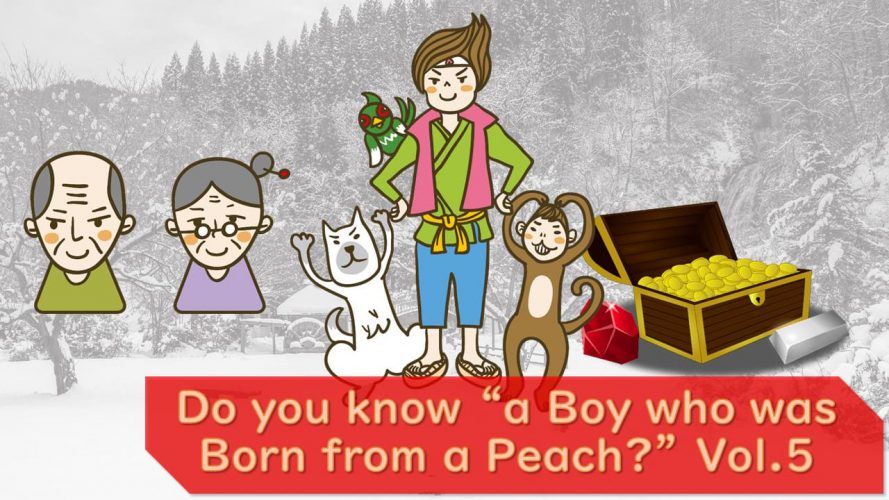JAPANESE LESSON
Do you know “a Boy who was Born from a Peach?” Vol. 5

Today, let’s read a Japanese famous old tale, “桃太郎(ももたろう).” You may know this story as “Peach boy.”
This is a series of the story “桃太郎(ももたろう)” and I recommend you to check the the previous lesson before you read this.
Last time, 桃太郎 arrived at Onigashima and start fighting against a demon. Today, you’re going to witness the ending of the story.
Let’s read the last part of the story in Japanese and learn Japanese.
するとお城(しろ)から沢山(たくさん)の鬼(おに)が出(で)てきて、ついに大(おお)きな鬼(おに)があらわれました。
After a little while, many demons came out from the castle and finally, a big demon showed up.
「生意気(なまいき)な小僧(こぞう)。俺様(1)(おれさま)が懲(こ)らしめてやる。」
“What a impertinent boy you are. I’ll punish you.”
大(おお)きな鉄棒(てつぼう)を振(ふ)り回(まわ)しながら(2)言(い)いました。
The big demon said while swinging his big iron rod.
「あなたがかしら(3)ですか。」と言(い)うと桃太郎(ももたろう)はすばやく鉄棒(てつぼう)の上(うえ)に飛(と)び乗(の)り、
“You are the boss, aren’t you?” said Momotaro and jumped onto the iron rod quickly.
「悪(わる)い鬼(おに)、村人(むらびと)に悪(わる)いことをしたからには許(ゆる)せない。私(わたし)のこぶしを受(う)けてみろ。」
“Evil demon, I can’t forgive you because of your bad deeds. Take my fist.”
「アイタタ、ごめん。ごめん。許(ゆる)してくれ。降参(こうさん)だ。」
“Ouch! Sorry, sorry. Please forgive me. I surrender.”
「本当(ほんとう)に約束(やくそく)するか。」
“Will you promise me seriously?”
「約束(やくそく)する。嘘(うそ)はつきません。宝物(たからもの)をやります(4)。」
“I promise. I don’t tell a lie. I’ll give you some treasures.”
桃太郎(ももたろう)はお城(しろ)の金(きん)や銀(ぎん)や織物(おりもの)や、荷車(にぐるま)一杯(いっぱい)の宝物(たからもの)を手(て)に入(い)れました。
Momotaro got gold, silver, cloths, and a treasure full of a cart.
こうして、桃太郎(ももたろう)はおじいさんとおばあさんの待(ま)つ家(いえ)に帰(かえ)り、みんなで幸(しあわ)せにくらしました。
Then Momotaro went back to the house where old man and old woman are waiting, and they lived happily ever after.
Note
(1) 俺様(おれさま)
俺様 is one of the first persons, but it’s not a common expression in usual conversations.
Japanese people use “様(さま)” to show the respect. If we use “様” to ourselves, others feel it arrogant.
I don’t recommend you to use in usual conversations.
(2) ながら
ながら is a useful expression. You can use this in many times.
For example, we can say “歌(うた)いながらギターを弾(ひ)く” and it’s “I play the guitar while singing” in English.
We can use “ながら” when we do two things at the same time.
If the verb is “する,” it’ll be “しながら.” “会話(かいわ)しながら走(はし)る” is an example for this.
“会話(かいわ)する” is composed by “会話(かいわ), noun” + “する, verb.”
(3) かしら(頭)
“頭(かしら)” is another way to express “頭(あたま).”
As same as English, “あたま(かしら)” shows both “head” and “boss.”
In terms of meaning, both of them have the same meaning, but “かしら” sounds like old-fashion.
(4) やります
“やる” has several meanings.
- to do
- to give ← this time
- to make something(someone) move to another place
It has some other meanings including some slangs, such as violent and sexual ones.
I recommend you to memorize those three meanings.
The first one is the most common way to use. You can say “私(わたし)がやります” if someone is searching for a volunteer.
“宿題(しゅくだい)をやりなさい” means “Do your homework.”
The second one is “to give,” but please be careful to use this expression. That is because this sounds rude and arrogant if you use it to your boss or coworkers.
If it’s a casual situation and when you talk with your friends, you may use “これやるよ” as “I’ll give you this.”
The third one is to make something(someone) move to another place.
“これをそっちにやって” is “Put this in that place,” but this may also sounds casual.
This is the last part of “桃太郎.” They defeated the demos and their adventure finished.
I recommend you to read the story aloud in Japanese as a practice.
In the next blog, we’re going to focus on the grammar of Japanese language again.

Leave a Comment